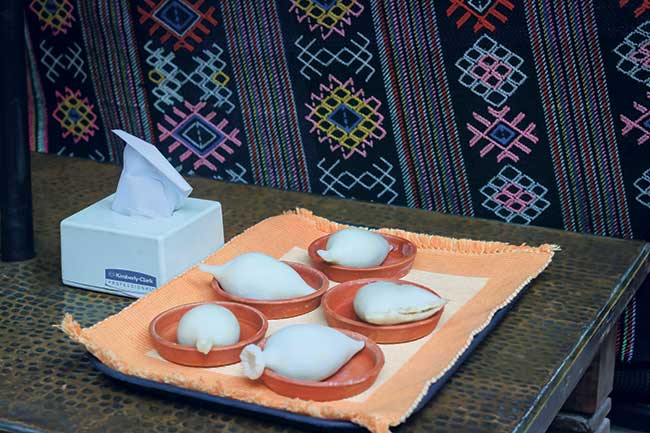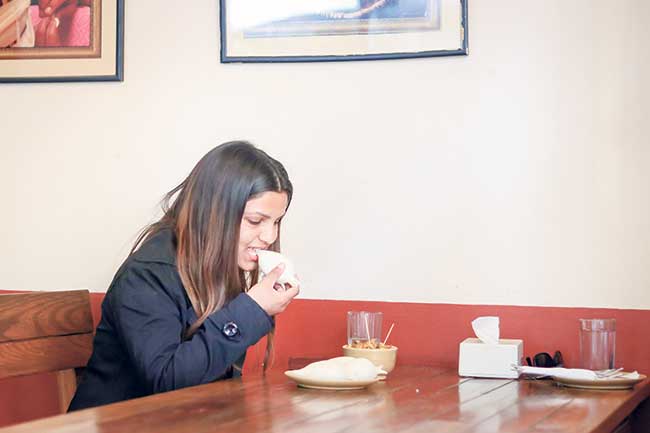KATHMANDU, Dec 3: Yomari (loosely translated as favorite bread item) is one of the most celebrated confectionaries among the Newari community. As the name suggests, Yomari Punhi is celebrated on the full moon day of Thinla, second month of Newari calendar. It usually falls on the Nepali month of Mangsir or November/December (this year on December 3). Yomari is just not a sweet delicacy. It is very fulfilling, nutritious and helps you increase your body temperature, making it apt food consumption in the winter season. Though the delicacy was enjoyed mostly within the community only, at present, it has garnered much love from people of other communities as well.
And as soon as the day approaches, those from the Newar community get demands or requests from their friends and colleagues to bring them yomari. They get the requests regardless of yomari being made in their households.
With the contemporary love for yomari, the sweet itself has also been contemporized and now one can get to eat varieties of yomari. Traditionally, a yomari is a cone-shaped steamed dumpling made from refined rice flour mixed with hot water. After the dough cools down, one takes oil in the palm and shapes smaller pieces of the dough in a cone shape with space for different fillings. Yomari is a delicate food and one needs to be careful about the force they apply while shaping it.
One end of yomari is always pointed. It is believed that longer the tip of yomari is, longer the daytime will be in days to come. It can also be observed as the winter solstice among the Newari community. The open end, after filling, is closed and decorated like a crown for the sweet.
Understanding cultural significance of Yomari Punhi

Change in taste
Conventionally, fillings in yomari include a paste of chaku (molasses), black sesame seeds and sugar. Apart from that, yomari also come in fillings with a paste of khuwa mixed with optional spices like cardamom, cinnamon, coconut, dry fruits and sugar. We can see that people have gone creative and made fusions as yomari now comes with other flavors and combinations. One can eat yomari with chocolate, mushroom, coffee, lentil and in few cases even with meat fillings. Yomari can get as creative as the one who makes it.
Another distinct character of yomari that has been experimented with is the top end part. Depending on the flavor or to attract, yomari get varied designs—from traditional two-pointed tip to moon shaped, from circular to star shaped—the shapes changes as one who makes them can decide how to decorate.
Some have even stepped up the game by giving colors to the traditionally white-colored sweet. People put food coloring to make different types of yomari—red, blue, green or collectively rainbow colors.
Experimentations are also evident in the shapes and sizes of yomari. Normally, yomari is the about three-five inches in length. But it can be made in smaller or larger size for commercial purposes. “Newari community has such rich food culture which is balanced and nutritious at the same time. We spend money on cakes, pastries and other sweets, but a contemporized yomari can compete with all of them. We can not only promote our culture through yomari but also give jobs to the local people,” said Rajee Dhittal, who manages The Village Café in Pulchowk, adding, “We soon plan to introduce a platter where we give customers small-sized colorful yomari like treats.”
“The competition has increased and experimenting gives freshness to those who eat. Such experiments do not necessarily need to tamper with the cultural importance of yomari. Rather it is important in the present scenario that we experiment and introduce this delicacy to more people while also retaining the culture of yomari from generation to generation,” Rajee added.
This might be taken as a one-day festival but there is no hard and fix rule as to when you can eat yomari. Nowadays, yomari can be seen being sold in many places but The Village Café in Pulchowk sells yomari 365 days a year and has become its signature dish. People remember Village Café to enjoy the delicacy, which is all organic and comes in six different flavors, throughout the year.
Culture
There is no date to go back and see since when the festival started. But it is believed that a married couple from Panauti were the first to experiment and make yomari with fresh yield from their field. They offered yomari to Lord Kuber (god of wealth), who happened to pass by in a disguised form. Happy with the offering, Kuber blessed the couple with wealth. So, with the same belief, people of the Newari community have continued to make yomari on this day.
Yomari has also been compared with the earth. The two ends of a yomari are taken as the North and South poles of the Earth or the embodiment of horizon where the Earth and the sky come together. Some also believe yomari to be a representation of male and female counterparts of the society in one, promoting gender equality. The festival is a four-day celebration to mark the end of the rice-harvesting season. People make yomaris, offer them to Goddess Annapurna or Mother Earth, Goddess Laxmi or Lord Kumar, Lord Ganesh and Lord Kuber with the belief that it will bring wealth, health and prosperity. Holding different views and values of the harvesting season, communities within the Newar community make the offerings to different gods and goddesses to celebrate the day differently.
The festival is a four-day celebration to mark the end of the rice-harvesting season. People make yomaris, offer them to Goddess Annapurna or Mother Earth, Goddess Laxmi or Lord Kumar, Lord Ganesh and Lord Kuber with the belief that it will bring wealth, health and prosperity. Holding different views and values of the harvesting season, communities within the Newar community make the offerings to different gods and goddesses to celebrate the day differently.
On this day, children can also be seen singing and dancing, going from places to places to ask for food (yomari) and gifts from the elders.






































